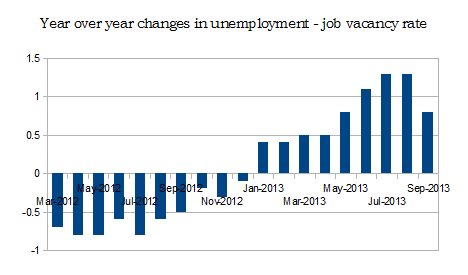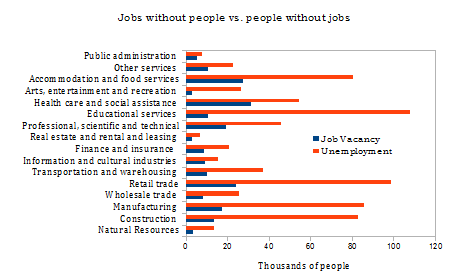The most recent Jobs Vacancy statistics are out, and the trend for 2013 so far has been a reduction in the number of job vacancies reported by businesses compared to 2012. The number of job vacancies reported by businesses fell by 41,000 between September 2012 and September 2013, so that even though there were fewer unemployed workers in September 2013, there were more unemployed workers per job vacancy. This has been true for every month in 2013 so far.
Data for the Job Vacancy survey started to be collected in January 2011, but it's released as a three-month rolling average, so the earliest monthly data is for January-February-March 2011. Comparing trends in year-over-year data since the survey began, we see that there was some improvement in the measure in 2012, but this has been reversed throughout 2013.
Even when we restrict the number of unemployed persons to those that have last worked in a given sector within the past 12 months (this means excluding new labour market entrants, re-entrants, and long-term unemployed workers), we find that the number of unemployed workers far outstrip the available jobs.
Beyond this broad analysis, the jobs vacancy survey in its current form falls short of our needs for labour market information. Sam Boshra and I co-authored a piece in the Economy Lab blog about where Canada's Jobs Vacancy Statistics fall short, and how the survey could be improved to better inform policy makers.
Statistics Canada does seem aware of these shortcomings, and conducted a one-time Workplace Survey in early 2012 (release date undetermined). This survey will provide information on "workplace demographics, workplace employment profile, labour turnover, job vacancies, hard-to-fill jobs and their impacts for employers, as well as current and future skills-shortage vacancies". In the spirit of 'something is better than nothing', I eagerly await the release of findings & data from this survey.








